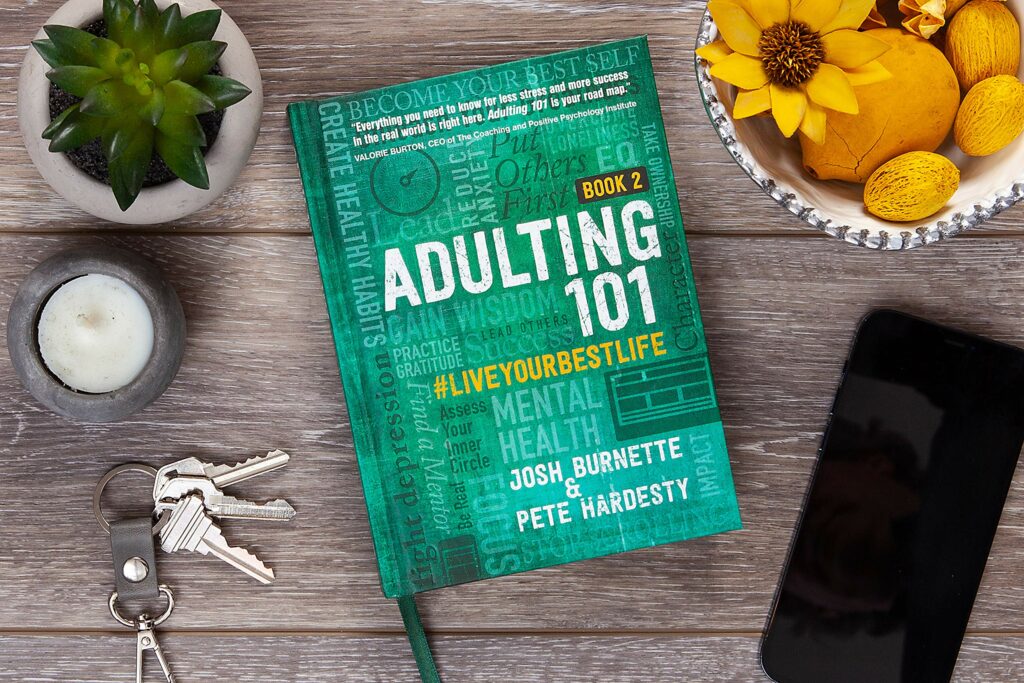The year was 1995. Saved by the Bell was all the rage. It was my sophomore year in college and I was invited to do my first ever weekend program at Lake Champion in front of 500 high schoolers. I was excited… and so nervous. We were game show hosts—Pep Pepperson and Buck Buckelson, or something like that. When our entrance music started, I didn’t even go out on stage. I couldn’t. I was paralyzed. I was dry heaving over a trashcan backstage because my anxiety was so bad. My program partner was not happy with me. After so much practice, I had hung him out to dry and he was left to do the run-on skit by himself. At the second club I managed to make it out on stage and stumbled through a couple of lines. It was bad. Really, really bad.
For a couple of years, when I gave club talks, I had a facial tick. During pauses, I would make a really weird face. I never knew it until I saw a video of me speaking. I just thought I was smiling. For most of my adult life, I have struggled with insomnia. Over the past couple of years I experienced some heart irregularities. My heart would skip a beat and I would be out of breath for a couple of seconds. When my friends ask, “How do you deal with anxiety?” I usually respond “poorly.”
Fast forward and now I’ve been on Young Life staff for 23 years. I’ve done program at summer camps close to a dozen times and have also been the camp speaker. My anxiety has not disappeared, but I’ve learned to manage it.
Anxiety has now surpassed depression as the most common mental health diagnosis among college students, though depression, too, is on the rise. More than 1/2 of students visiting campus clinics cite anxiety as a health concern. Nearly 1 in 6 college students have been diagnosed with or treated for anxiety within the last 12 months, and 62% of undergrads report overwhelming anxiety, according to the annual national survey.
Anxiety is not just a challenge for young people. Anxiety disorders are the most common mental illness in the U.S., affecting over 40 million adults. Anxiety disorders are highly treatable, yet only 36.9% of those suffering receive treatment.
So if you feel anxiety, sometimes at an intense level, YOU ARE NOT ALONE.
I’ve had times, especially during college and my twenties, that I remember being so anxious I couldn’t eat, sleep, or function. It was paralyzing. Then I remember times that my anxiety had the opposite effect. It propelled me into a manic state of action. Trying to get more done, do things better, work harder. It seems to affect every person differently.
So what do we do?
We asked five expert counselors/therapists for their best advice on how to cope with anxiety and combined their responses with a hefty amount of research. Here are the top twelve strategies we found.
Strategies for Battling Anxiety
REDUCE SCEEN USAGE
Take an inventory of all your technology, screen, and social media use. Now take a break from it! People (myself included) often take short breaks from work by scrolling through Instagram, Snapchat, TikTok, Twitter, or Facebook, and this habit appears to be doing more harm than good. Studies have found that the more someone uses social media, the more anxious they become, and the more likely they are to have an anxiety disorder.
Please remember that most of what you see on television and on social media is a false reality and are curated, literally filtered images of real things. Make a goal to reduce your screentime and social media use by a small, manageable amount this week.
PRACTICE SELF-CARE
Many people struggle to maintain healthy eating habits, consistent exercise, and regular sleep schedules during times of transition or change in their lives—new job, new home, new city, new significant other, finals, etc. Prioritizing your self-care behaviors becomes extremely important for maintaining your life’s natural rhythms and helping you cope with stress.
SLEEP
Set a consistent bedtime and wake-up time each day. Avoid using your bed for any activities that don’t belong in bed. Avoid caffeine in the evening and monitor your alcohol intake, as both interfere with restful sleep. Take a hot shower or bath in the evening and allow yourself to relax.
REST
Create margin in your life. Avoid overfilling your calendar. Try not to stack appointments without allowing for some breathing room.
EXERCISE
Thirty minutes of exercise per day, at whatever level of fitness you are, will make a world of difference. It’s been shown to have similar effects as antidepressants, as it helps the brain produce natural mood-stabilizing chemicals and develop healthy coping mechanisms.
EAT WELL
That means real fruits and vegetables. Reduce your sugar intake, specifically processed sugars. Pay attention to what you’re eating, especially the first meal of the day, as it can set the course and tone for the rest of your day. Avoid eating late at night. Think of your body as a finely tuned sports car. You want to fuel it with premium gasoline in order to run at optimal speed.
DETOX
Reduce or remove any chemicals from your body that increase or heighten symptoms of anxiety. Again, reduce caffeine. Eliminate nicotine. Avoid stimulants such as those found in energy drinks.
NAME IT
Identify your anxiety. Recognize it. Let anxiety know you see it and feel it and acknowledge its presence. Let’s revisit the car analogy. Anxiety is allowed to be in the car; it can even be loud and obnoxious, but it isn’t allowed to drive the car. You are the driver. Don’t just listen to your thoughts but speak to them. You don’t have to control your thoughts and feelings; you just have to keep them from controlling you. Feelings are great friends but terrible bosses.
Give yourself permission to feel the weight of your reality. Keeping your feelings and struggles bottled up inside is like trying to keep a beach ball underwater. It’s going to surface no matter how hard you try to hold it down. What’s in the well comes up in the bucket.
Remember my embarrassing story of stage fright from earlier? I honestly thought I might never get on a stage again. After I started acknowledging anxiety’s presence, it got a little better. The intensity started to subside. It was still very much there, but it wasn’t driving the car, I was. I still have anxiety, but I allow those nervous feelings to increase my alertness and help my performance instead of inhibiting it. It took a lot of practice, but it’s become helpful anxiety, not harmful. Public speaking is now something that I genuinely look forward to doing. Be afraid and step into it anyway. Nobody gets over a fear of heights by standing on the ground.
DON’T FEAR THE LABEL
It’s okay to not be okay. Anxiety is common for people in late adolescence. The name simply describes what we’re experiencing. It’s not a disease to be feared or a label to define us. For many, it’s not a permanent diagnosis. Taking medication for it is not necessarily a life sentence. Attack it. Be ruthless about trying new coping strategies.
No need to hurry. No need to sparkle. No need to be anybody but oneself.
Virginia Woolf (1882–1941)
BREATHE
You might be tempted to skip this one. I know I was. It sounds silly, but focused breathing is the number one preventative measure for anxiety. We take up to twenty-three thousand breaths every day, and if we work on this, we can move the needle. Anxiety literally takes our breath away, so take it back.
One technique is called square breathing, also known as box breathing. Slowly inhale deep breaths while counting to five. Then hold it while counting to five. Slowly let it out while counting to five. Once it’s out, count to five. Repeat ten times. Or, try belly breathing: “If you ever watch children sleep, they all breathe from the belly and not the chest. This relaxed state is the more normal way to breathe,” says Dr. Katherine Rosa of the Harvard-affiliated Benson-Henry Institute for Mind and Body Medicine.
If you’ve never tried this before, try this exercise: sit in a chair, lean forward, and place your elbows on your knees. Then breathe naturally. Or put one hand on your chest, the other one on your belly, and then take deep breaths. You want the chest hand to remain still and the belly hand to move out. YouTube also has tons of videos from professionals showing you how to practice controlled breathing.
CONNECT
Ask for help. Find a trusted friend or confidant. Isolation can be a trigger for anxiety, so get connected with a community. Most people, when given the chance to express how they feel and what they’re struggling with, find relief and hope. Talk to someone you trust—could be your small group, your team leader, your Area Director, your pastor, your Young Life leader. You can’t do this alone, and you weren’t meant to. We all need people to help us process, mature, and cheer us on.
GO PRO
When anxiety gets big enough and isn’t getting better, see a professional counselor or therapist. The best first place to look is your church. Anxiety is the second most common issue for people who seek counseling and therapy. Counselors and therapists are professionally trained to help us battle anxiety, and these forms of treatment are often the most effective option: “Anxiety therapy—unlike anxiety medication—treats more than just the symptoms of the problem. Therapy can help you uncover the underlying causes of your worries and fears. … Therapy gives you tools to overcome anxiety.”
Many companies offer counseling services for their employees as part of their health benefits. Some offer special services for new employees as part of orientation. If you are in college or graduate school, almost every school offers free resources for their students. You can even seek online counseling from the comfort of your own home now.
PRAY SCRIPTURE
Prayer and meditation are great tools for reducing anxiety as well. The Bible is a living document–it is active and dynamic and it can speak truth and love and comfort right to your heart. So can Jesus. He wants to bring you peace and security. Below is a list of Scriptures about anxiety, worry, peace, and more. You can meditate on these and pray them aloud and these will help you in your quest to conquering anxiety.
- He [God] will keep in perfect peace him whose mind is steadfast, because he trusts in you. – Isaiah 26:3
- Do not be anxious about anything, but in everything, by prayer and supplication, and with thanksgiving, let your requests be made known to God. And the peace of God, which surpasses all understanding, will guard your hearts and your minds in Christ Jesus. – Phil 4:6-7
- When anxiety was great within me, your consolation brought me joy. – Psalm 94:19
- Anxiety weighs down the heart, but a kind word cheers it up. – Proverbs 12:25
- Come to me, all you who are weary and burdened, and I will give you rest. Take my yoke upon you and learn from me, for I am gentle and humble in heart, and you will find rest for your souls. For my yoke is easy and my burden is light. – Matthew 11:28-30
- Cast all your anxiety on him because he cares for you. – I Peter 5:7
- The Lord is my stronghold of my life–of whom shall I be afraid?…For in the day of trouble he will keep me safe in his dwelling; he will hide me in the shelter of his sacred tent and set me high upon a rock. – Psalm 27
- I have told you these things, so that in me you may have peace. In this world you will have trouble. But take heart! I have overcome the world. – John 16:33

A large portion of this article was adapted from the new book Adulting 101 Book 2 by Joshua Burnette and Pete Hardesty that just released!




